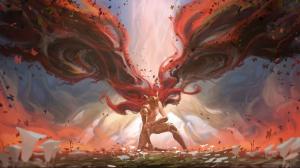The term "epic theater" (also spelled "epic theater" in German) refers to a dramatic movement that developed in the early to mid-20th century from the theories and methods of a number of theater artists who responded to the political context of the time by producing new political tragedies. The term "epic theater" refers to the format of a production rather than its size or scope.
Through a range of approaches that purposefully prompt each audience member to engage in the performance in a different way, epic theatre highlights the audience's viewpoint and response to the work. Epic theater forces viewers to accept their reality rather than trying to persuade them to suspend their disbelief.
Epic theater, also known as German episches Theater, is a type of didactic drama that presents a collection of haphazardly connected episodes that eschew illusion and frequently pause the action to address the audience with explanation, justification, or supporting evidence. The theatrical philosophy and technique developed in Germany from the 1920s onward by the playwright-director Bertolt Brecht are today most frequently linked to epic theatre.
The episodic format and didactic nature of the pre-Expressionist drama by German playwright Frank Wedekind as well as the Expressionist theater of German directors Erwin Piscator (with whom Brecht collaborated in 1927) and Leopold Jessner, both of whom made flamboyant use of the technical effects that would come to characterize epic theatre, are some of its dramatic antecedents.
Marxist in outlook, Brecht sought to engage the mind of his audience by addressing ethical dilemmas and portraying modern social realities on stage. His goal was to prevent their emotional reactions, as well as their propensity to identify with the characters and become engrossed in the story.
In order to achieve this, he employed "alienating" or "distancing" effects that forced the audience to consider the play critically, consider its thesis, comprehend it, and form conclusions.
Brecht's epic theater stood in stark contrast to the naturalistic acting and staging techniques promoted by the Russian director Konstantin Stanislavsky, who sought to make the audience feel as though the action onstage was "genuine." Brecht gave his players the instruction to maintain a certain distance between themselves and the characters they were portraying, taking inspiration from Chinese theater customs.
They were instructed to ignore their inner selves and feelings in favor of focusing on their outward behaviors as indicators of social ties. It was determined that a character's general views toward another may be inferred from their gestures, tone, facial expressions, and grouping.
What is Epic Theater
Epic creates empowering theater. The artists at Epic are equal parts cyphers and mentors; they innovate and astound; they instruct and motivate; they transform the conflicts of history into lessons for the present and future; and they struggle to take the front stage in public discourse.
Because we both possess a youthful zeal for justice, we place a high priority on the voices of young people. We think that theater that taps into this passion transforms audiences from passive bystanders into active participants creating a more inclusive and cooperative vision of America.
By making theatre radically accessible, Epic's artists disrupt the institutional status quo by including thousands of students and first-time audiences in the transforming process of revealing their own stories and developing a profound empathy for those of others.
At Epic, we place a premium on inclusivity because it encourages artistic rigor and excellence across all of our programs, reflecting the exceptional professional work we showcase on our professional stages.
The History of Epic Theater
Erwin Piscator is credited with coining the phrase "epic theater" during his first year in charge of Berlin's Volksbühne (1924–27). Piscator's goal was to inspire playwrights to tackle themes of "current living," which would then be produced using documentary elements, audience participation, and techniques to foster an objective response.
Epic theater uses an acting style known as gestus, according to Brecht. Epic theater and its many forms are a response to Richard Wagner's concept of "Gesamtkunstwerk," or "total artwork," which intends for each piece of art to be composed of other art forms.
This was one of Brecht's most significant aesthetic innovations, prioritizing function over the sterile dichotomous opposition between form and content. These two conceptions conflict even though Brecht was greatly influenced by Wagner, as epic drama is so focused on the precise link between form and substance.
In his essay "A Short Organum for the Theatre," Brecht outlined the goals and strategy of epic theater. Brecht unified, developed, and popularized Brechtian epic theater, which draws on ideas and techniques that have been existing for decades or even centuries.
Brecht favored the term "dialectical theatre" toward the end of his career to characterize the style of theater he invented. From his latter perspective, the concept of "epic theatre" had grown to be too formal to be useful. The word alludes to the "'dialecticising' of events' that this style to theatre-making produces," according to Manfred Wekwerth, one of Brecht's directors at the Berliner Ensemble at the time.
The early naturalistic approach and later "psychological realism" pioneered by Konstantin Stanislavski are two theater styles that are separate from epic theater. Like Stanislavski, Brecht detested melodrama's superficial spectacle, deceptive storytelling, and exaggerated emotions; nevertheless, Brecht considered melodrama as an escape from reality, whereas Stanislavski sought to elicit true human behavior through acting through the use of Stanislavskian techniques.
Along with being separate from surrealism and the Theatre of Cruelty as explored in Antonin Artaud's writings and dramaturgy, Brecht's own social and political agenda intended to influence audiences viscerally, psychologically, physically, and irrationally. Even while both shocked the audience, epic theater techniques also included a subsequent moment of realization.





